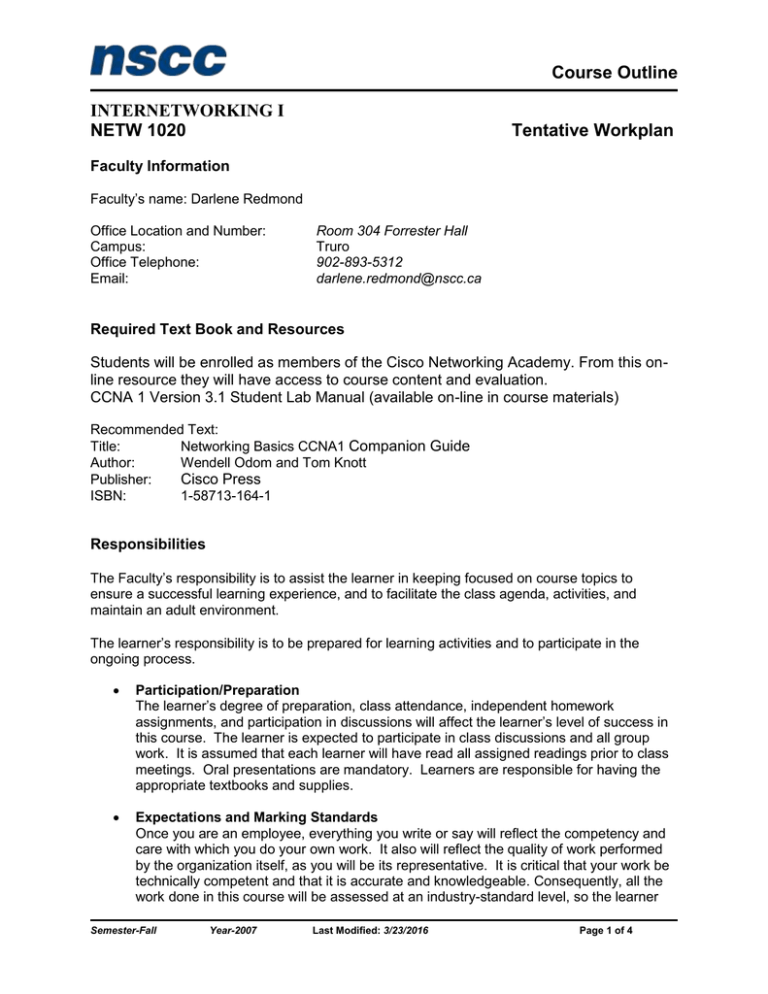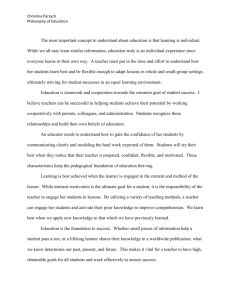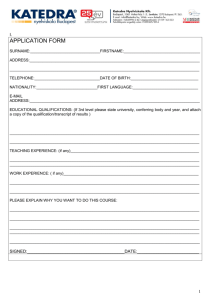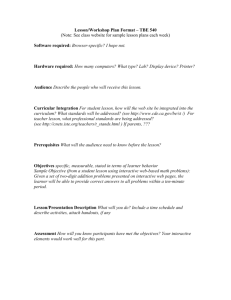CCNA1 Tenatative Workplan
advertisement

Course Outline INTERNETWORKING I NETW 1020 Tentative Workplan Faculty Information Faculty’s name: Darlene Redmond Office Location and Number: Campus: Office Telephone: Email: Room 304 Forrester Hall Truro 902-893-5312 darlene.redmond@nscc.ca Required Text Book and Resources Students will be enrolled as members of the Cisco Networking Academy. From this online resource they will have access to course content and evaluation. CCNA 1 Version 3.1 Student Lab Manual (available on-line in course materials) Recommended Text: Title: Networking Basics CCNA1 Companion Guide Author: Wendell Odom and Tom Knott Publisher: Cisco Press ISBN: 1-58713-164-1 Responsibilities The Faculty’s responsibility is to assist the learner in keeping focused on course topics to ensure a successful learning experience, and to facilitate the class agenda, activities, and maintain an adult environment. The learner’s responsibility is to be prepared for learning activities and to participate in the ongoing process. Participation/Preparation The learner’s degree of preparation, class attendance, independent homework assignments, and participation in discussions will affect the learner’s level of success in this course. The learner is expected to participate in class discussions and all group work. It is assumed that each learner will have read all assigned readings prior to class meetings. Oral presentations are mandatory. Learners are responsible for having the appropriate textbooks and supplies. Expectations and Marking Standards Once you are an employee, everything you write or say will reflect the competency and care with which you do your own work. It also will reflect the quality of work performed by the organization itself, as you will be its representative. It is critical that your work be technically competent and that it is accurate and knowledgeable. Consequently, all the work done in this course will be assessed at an industry-standard level, so the learner Semester-Fall Year-2007 Last Modified: 3/23/2016 Page 1 of 4 Course Outline will know what is expected. The purpose of this course is to allow the learner to acquire the skills and confidence necessary to perform well in the workplace. Integrity of Learning Environment Cell phones, CD players, MP3 players, other portable electronic communicating devices, personal digital assistants (PDAs) or similar devices shall not disrupt class or lab. If absolutely essential, cell phones may be left in vibrate mode for emergency purposes during regular classes. In such cases learners are asked to respect the learning environment of their fellow classmates and not answer calls in class. No portable electronic communicating device is permitted during tests or exams. Any learner who uses or attempts to use such a device for any purpose shall be asked to submit their paper and leave the test or exam room immediately. Illnesses and Absences It is the responsibility of the student to makeup work missed as a result of any absence and to determine their eligibility to write any tests missed during the absence as outlined under “Evaluation” below. Methods of Instruction A variety of methods will be used, including but not limited to: - short lectures - demonstrations - group work - online and other research - individual and group assignments - individual and group projects Evaluation Labs (5@2%) Module tests (5@10%) Skills exam Final exam 10% 50% 20% 20% All online module assessments must be written and a passing grade attained before student is eligible to write the Cisco online final. Tests and Assignments Assignments are to be handed in on or before the specified date, and will incur a late penalty of 10% per day. Late assignments will not be accepted after assignments have been corrected and returned to other learners. Tests missed for any reason other than medical and/or family emergency, or Faculty authorized reasons, will not be written on another date. Faculty authorization for missing a test must be obtained prior to the test date. Semester-Fall Year-2007 Last Modified: 3/23/2016 Page 2 of 4 Course Outline Illnesses, Absences and Test Make-Ups Where a learner misses a test because of illness or emergency, and has informed his/her Departmental Office (893-5312) by telephone on the morning of their absence, then they may be eligible to write a make-up test. The make-up test will be held near the end of the semester and it will cover the semester’s work. The mark received on the make-up test will be used as the mark for the test that was missed. If a test is missed, it is the learner’s responsibility to: o Determine whether he/she is eligible to write the make-up o Find out the date/time of the make-up test o Determine the material to be covered on the make-up test Semester-Fall Year-2007 Last Modified: 3/23/2016 Page 3 of 4 Course Outline Tentative Schedule Because every class is different, it is effective to tailor the pace, workload, and delivery method to the strengths of the class. In a creative learning environment you should expect some variations from this work plan. Week Content Intro to CCNA1 1 Assignments/Labs 2 Module 1 Introduction to Networking Lab Mod 1 and 2 2% 3 Module 2 Networking Fundamentals Test 1 Mod 1 and 2 10% 4 Module 3 Networking Media Module 4 Cable testing Lab Mod 3 and 4 2% 5 Module 5 Cabling LANs and WANs Lab Mod 5 Test 2 Mod 3 and 4 12% 6 Module 6 Ethernet Fundamentals Module 7 Ethernet Technologies Test 3 Mod 5, 6 and 7 10% 7 8 Module 8 Ethernet Switching 9 Module 9 IP Addressing Lab Mod 9 10 Module 10 Routing and Subnetting Test 4 Mod 8 and 9 12% 11 Module 10 Routing and Subnetting Lab Mod 10 2% 12 Module 11: The Transport and Application Layers Test 5 Mod 9 and 10 10% 13 14 Review Skills Exam Final Exam 20% 20% Review Darlene Redmond Faculty Date: Academic Chair Sept 09, 2009 Semester-Fall Year-2007 Date: Last Modified: 3/23/2016 Page 4 of 4






